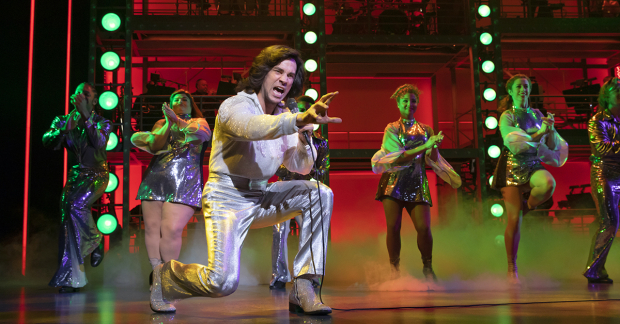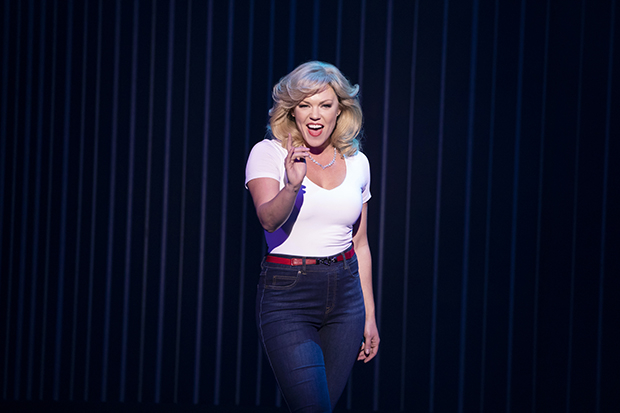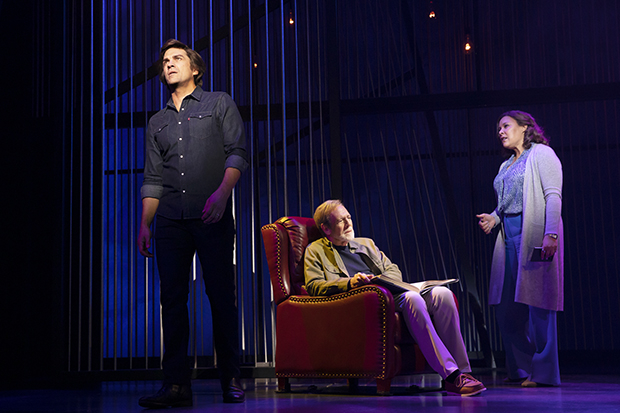Review: Neil Diamond Musical A Beautiful Noise Is So Meh, So Meh, So Meh
But the AARP crowd will love it.

(© Julieta Cervantes)
The best thing I can say about the Neil Diamond musical A Beautiful Noise is that it knows its audience. Every performance at the Broadhurst Theatre must feel like a Wednesday matinee. "He sounds just like him!" the 60- and- 70-year-olds exclaim at intermission, having clapped along to "Song Sung Blue" and "Bah, bah, bah"-ed to every verse of "Sweet Caroline." Clearly, the AARP crowd will get the most out of Broadway's latest bio-musical, a harmless and generally pleasant survey of Diamond's meteoric rise to become one of the best-selling musicians of all time. As for the rest of us? Well, there were times I forgot about the show as I sat there watching it.
Written by Anthony McCarten, A Beautiful Noise finds an aging Neil (Mark Jacoby) in therapy, with an unnamed Doctor (Linda Powell) urging him to reflect on his life. Refusing to do so, Doctor Linda one-ups her famous client by pulling out a book of his collected lyrics and going song by song to prompt his memories.
As the gangly named "Neil — Now" and Doctor Linda observe the action from red armchairs on the periphery (the only things missing are a bucket of popcorn and Nicole Kidman proclaiming the magic of cinema…err, live theater), his adventures spring to life before them. The similarly clumsily named "Neil — Then" (Will Swenson) works his way from the Brill Building to the Bitter End to the big time, becoming more and more renowned. Wives (Jessie Fisher and Robyn Hurder) come and go, but his celebrity lasts forever — and so does his depression.
Most of McCarten's musical is based on Diamond's inner conflict of being so famous and feeling so unsatisfied by it (man versus himself, as the writing teachers call it). Jacoby, who barely leaves the stage but has a relatively light load to bear compared to Swenson, beautifully communicates this struggle through facial expressions and body language; it's a master class in doing a lot with not very much at all. Jacoby takes it on home in an extraordinary eleven o'clock crescendo of "I Am…I Said."

(© Julieta Cervantes)
But what McCarten inadvertently ends up proving is that Diamond, for all his great songs, didn't really lead an interesting life (and for a show that's all about discovering the singer through his lyrics, McCarten and director Michael Mayer certainly don't find any nuance in them). There's a small amount of outward conflict here and there: an early record deal with Bert Berns (Tom Alan Robbins) is backed by a mafia kingpin (Michael McCormick) who offers intimidation as a motivator. Neil ignores his way through two marriages that naturally end in divorce. His biggest threat, writer's block, ultimately leads to the creation of the song that makes him a perennial wedding party staple. As typical now in these projects where the only goal is for the artist to earn a few more dollars toward that new swimming pool, we learn absolutely nothing new about what makes the man tick.
Mayer's direction here is of the traffic cop variety, arranging attractive stage pictures with his designers (David Rockwell's trippy, guitar-string set and Emilio Sosa's spandex costumes are nicely accentuated by Kevin Adams's lava lamp lighting) and allowing Steven Hoggett's silly but occasionally exciting choreography to dominate. The 10-member ensemble (which has no reason to exist other than to make the show feel like a musical) and 13-piece band jamming to "Crunchy Granola Suite" in the second act is the highlight of a show that evaporates from your brain while it's still going on.
Mayer, cruising on autopilot, certainly doesn't do much substantial work with his principal actors, who all seem to be having a very nice time doing their own thing, without cohesion. Robbins and McCormick are so over-the-top and nonthreatening that it's impossible to take any of their dramatic moments seriously. Bri Sudia (who plays singer Ellie Greenwich, who discovered Diamond) and Jessie Fisher (as Diamond's first wife, Jaye) are generally colorless; Fisher has the misfortune of signaling the end of their marriage with "Love on the Rocks," a song choice that gets more chortles than applause. Hurder fares way better — not only does she actually find a character to play, she has so much presence that you can't help but focus on her whenever she's on stage. Her big number, "Forever in Blue Jeans," is a feast that proves once again why she's one of the best dancers currently working on Broadway, even if most of Hoggett's choreography involves her just strutting around the stage.
A Beautiful Noise has the dubious distinction of making the extremely handsome Swenson unattractive, in more ways than one. He doesn't look or sound like Diamond — certainly not in the way that, say, Stephanie J. Block sounded like Cher and Adrienne Warren sounded like Tina Turner — and his air of disinterest is palpable. Saddled with an unfortunate wig (Luc Verschueren), an uncomfortably frozen smile/scowl combo, and obnoxiously loud sound design (Jessica Paz) that obscures his vocals, Swenson is delivering the kind of performance you see from an actor who's been in a show for too long and is ready to move on.
Ironically, the most emotional moment of the night comes late in the second act, when ensemble member Jordan Dobson performs an acoustic version of "Shilo." Dobson isn't playing a character or anything, he's just sitting there singing. Untethered from the flashing lights and jittery movement and cheesy dialogue, the simplicity of this small scene becomes the thing that everyone leaving the theater remembers, despite the obligatory singalong mega mix thereafter. No bah, bah, bahs are necessary to convey what it means, and I wish the rest of the show behaved the same way.

(© Julieta Cervantes)









